How To End A Letter + Examples In English

Ending a letter can be tricky, especially if you’re unsure of the appropriate way to close it. Whether you’re writing a personal or professional letter, it’s important to leave a lasting impression on the recipient. In this post, we’ll cover everything you need to know about how to end a letter in English, including examples and tips for various scenarios.
1. Understand the Purpose of Your Letter
The way you end your letter will depend on the purpose of your communication. Are you writing a formal business letter, or a more casual letter to a friend? Understanding the purpose of your letter will help you choose the right closing.
1.1 Formal Business Letter
If you’re writing a formal business letter, you should choose a closing that reflects the professional tone of your communication. Some appropriate closings for a formal business letter include:
- Sincerely
- Regards
- Best regards
- Yours truly
- Respectfully
These closings are all appropriate for a formal business letter and convey a sense of professionalism and respect.
1.2 Casual Letter
If you’re writing a more casual letter to a friend or family member, you can choose a closing that reflects the tone of your relationship. Some appropriate closings for a casual letter include:
- Take care
- Best wishes
- Warmly
- Love
- Thinking of you
These closings are more relaxed and convey a sense of warmth and affection.
2. Consider the Relationship with the Recipient
When choosing a closing for your letter, it’s important to consider the nature of your relationship with the recipient. If you’re writing to a business associate or someone you don’t know well, a formal closing is more appropriate. If you’re writing to a close friend or family member, a casual closing is more appropriate.
2.1 Business Associate
If you’re writing to a business associate or someone you don’t know well, you should choose a closing that reflects the professional nature of your relationship. Some appropriate closings for a business associate include:
- Sincerely
- Regards
- Best regards
- Yours truly
- Respectfully
2.2 Close Friend or Family Member
If you’re writing to a close friend or family member, you can choose a more casual closing that reflects the nature of your relationship. Some appropriate closings for a close friend or family member include:
- Love
- Best wishes
- Hugs
- Kisses
- Thinking of you
3. Use Appropriate Punctuation
When ending a letter, it’s important to use appropriate punctuation. In most cases, you’ll end your letter with a comma followed by your closing. For example:
Sincerely,
If you’re using a more casual closing, you can use an exclamation point instead of a comma. For example:
Best wishes!
It’s also important to capitalize the first letter of your closing, regardless of whether you’re using a formal or casual closing.
4. Examples of Letter Closings
Here are some examples of letter closings for various scenarios:
4.1 Formal Business Letter
- Sincerely,
- Regards,
- Best regards,
- Yours truly,
- Respectfully,
4.2 Casual Letter
- Take care,
- Best wishes,
- Warmly,
- Love,
- Thinking of you,
4.3 Thank You Letter
- Thank you again,
- With gratitude,
- Appreciatively,
- Yours thankfully,
- Many thanks,
4.4 Cover Letter
- Sincerely,
- Best regards,
- Thank you for your time,
- Yours truly,
- Respectfully,
5. Conclusion
Ending a letter may seem like a small detail, but it can make a big difference in how your message is received. By choosing an appropriate closing and using proper punctuation, you can leave a lasting impression on the recipient. Remember to consider the purpose of your letter and the nature of your relationship with the recipient when choosing a closing.
6. FAQs
6.1 What is the best way to end a business letter?
The best way to end a business letter is with a closing that reflects the professional tone of your communication, such as “Sincerely” or “Regards.”
6.2 What is the best way to end a casual letter?
The best way to end a casual letter is with a closing that reflects the tone of your relationship, such as “Take care” or “Best wishes.”
6.3 Is it okay to use an exclamation point in a letter closing?
If you’re using a more casual closing, it’s okay to use an exclamation point instead of a comma. For example, “Best wishes!”

